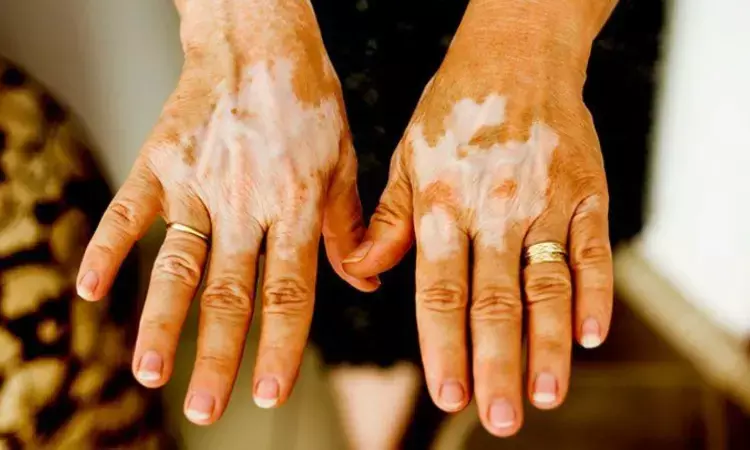- Home
- Medical news & Guidelines
- Anesthesiology
- Cardiology and CTVS
- Critical Care
- Dentistry
- Dermatology
- Diabetes and Endocrinology
- ENT
- Gastroenterology
- Medicine
- Nephrology
- Neurology
- Obstretics-Gynaecology
- Oncology
- Ophthalmology
- Orthopaedics
- Pediatrics-Neonatology
- Psychiatry
- Pulmonology
- Radiology
- Surgery
- Urology
- Laboratory Medicine
- Diet
- Nursing
- Paramedical
- Physiotherapy
- Health news
- Fact Check
- Bone Health Fact Check
- Brain Health Fact Check
- Cancer Related Fact Check
- Child Care Fact Check
- Dental and oral health fact check
- Diabetes and metabolic health fact check
- Diet and Nutrition Fact Check
- Eye and ENT Care Fact Check
- Fitness fact check
- Gut health fact check
- Heart health fact check
- Kidney health fact check
- Medical education fact check
- Men's health fact check
- Respiratory fact check
- Skin and hair care fact check
- Vaccine and Immunization fact check
- Women's health fact check
- AYUSH
- State News
- Andaman and Nicobar Islands
- Andhra Pradesh
- Arunachal Pradesh
- Assam
- Bihar
- Chandigarh
- Chattisgarh
- Dadra and Nagar Haveli
- Daman and Diu
- Delhi
- Goa
- Gujarat
- Haryana
- Himachal Pradesh
- Jammu & Kashmir
- Jharkhand
- Karnataka
- Kerala
- Ladakh
- Lakshadweep
- Madhya Pradesh
- Maharashtra
- Manipur
- Meghalaya
- Mizoram
- Nagaland
- Odisha
- Puducherry
- Punjab
- Rajasthan
- Sikkim
- Tamil Nadu
- Telangana
- Tripura
- Uttar Pradesh
- Uttrakhand
- West Bengal
- Medical Education
- Industry
PCSK9 Inhibitors May Reduce Risk of Vitiligo,Promising New Therapeutic Approach, reports study

Researchers have found that PCSK9 inhibitors, a class of lipid-lowering agents, may be associated with a sharply decreased incidence of developing vitiligo. The finding offers new avenues of therapeutic intervention in lipid metabolism-based therapies for the very disease-restricted options exist for. A study to this effect was just published in the Journal of Investigative Dermatology by Tae-Jong Kang and colleagues.
Vitiligo is a chronic, acquired skin disorder characterized by the loss of pigmenting agents in the skin and results in white patches of skin. The exact cause of vitiligo remains obscure, although several recent studies have suggested that lipid metabolism abnormalities may link with the state of the disease. Lipid-lowering agents have been proposed as potential therapeutic options, mainly PCSK9 inhibitors modulating the lipid profiles. The researchers investigated, in this paper, the genetically proxied effects of lipid-lowering agents on the risk of vitiligo and identified associated protein mediators that might further explain the protective effects observed.
In this study, genome-wide association study (GWAS) summary statistics were used for a large meta-analysis of vitiligo, along with data from the Global Lipids Genetics Consortium, the UK Biobank, and deCODE Genetics. These data were used to estimate the association of genetically proxied lipid-lowering agents with the risk of vitiligo. The MR analysis was performed to identify which lipid-lowering agents exerted protective effects against vitiligo, and multivariable and two-step MR analyses to explore the potential mediators between the lipid-lowering agents and the risk of vitiligo.
Key Findings
• MR analysis found out genetic inhibition of PCSK9, a protein involved in cholesterol metabolism, was associated with a significantly reduced risk of developing vitiligo. The odds ratio was 0.71, which represented a 29 percent reduced risk of vitiligo with PCSK9 inhibition.
• This protective effect was replicated in two independent biobank datasets: the UK Biobank (OR, 0.82; 95% CI, 0.71-0.96) and deCODE Genetics (OR, 0.78; 95% CI, 0.67-0.91).
• These consistent results across the different populations further strengthen the evidence for the role of PCSK9 inhibitors in reducing the risk of vitiligo.
• Further analysis was done to test whether the relationship between PCSK9 inhibition and vitiligo is driven by known lipid profiles.
• We found no evidence for these lipid profiles mediating this protective effect in multivariable MR analyses. Two-step MR analyses identified five potential protein mediators—CCN5, CXCL12, FCRL1, LGMN, and FGF2—that may play a role in the link of PCSK9 inhibition with reduced vitiligo risk.
These findings suggest that PCSK9 inhibitors already licensed for the lowering of cholesterol levels could be repurposed as a new vitiligo treatment. The identification of possible protein mediators supplies additional objectives for the development of drugs in the future. The researchers and clinicians can target PCSK9 and these mediators in an effort to develop more effective therapies for vitiligo and give some hope to the patients who are living with this rather serious condition.
This research provides evidence based on data that PCSK9 inhibitors could be a new avenue of treatment against vitiligo, wherein multiple data sets showed reduced risk. The identification of protein mediators raises comprehension of how lipid-lowering agents would affect vitiligo, further opening up avenues for targeted and more effective treatments.
Reference:
Kang, T.-J., Lee, S. Y., Yoon, S., Kim, E. G., Kim, J. O., Kim, J.-S., Park, J., & Nam, K.-H. (2024). PCSK9 inhibitors and the risk of vitiligo: a Mendelian randomization study. The Journal of Investigative Dermatology. https://doi.org/10.1016/j.jid.2024.07.021
Dr Riya Dave has completed dentistry from Gujarat University in 2022. She is a dentist and accomplished medical and scientific writer known for her commitment to bridging the gap between clinical expertise and accessible healthcare information. She has been actively involved in writing blogs related to health and wellness.
Dr Kamal Kant Kohli-MBBS, DTCD- a chest specialist with more than 30 years of practice and a flair for writing clinical articles, Dr Kamal Kant Kohli joined Medical Dialogues as a Chief Editor of Medical News. Besides writing articles, as an editor, he proofreads and verifies all the medical content published on Medical Dialogues including those coming from journals, studies,medical conferences,guidelines etc. Email: drkohli@medicaldialogues.in. Contact no. 011-43720751


